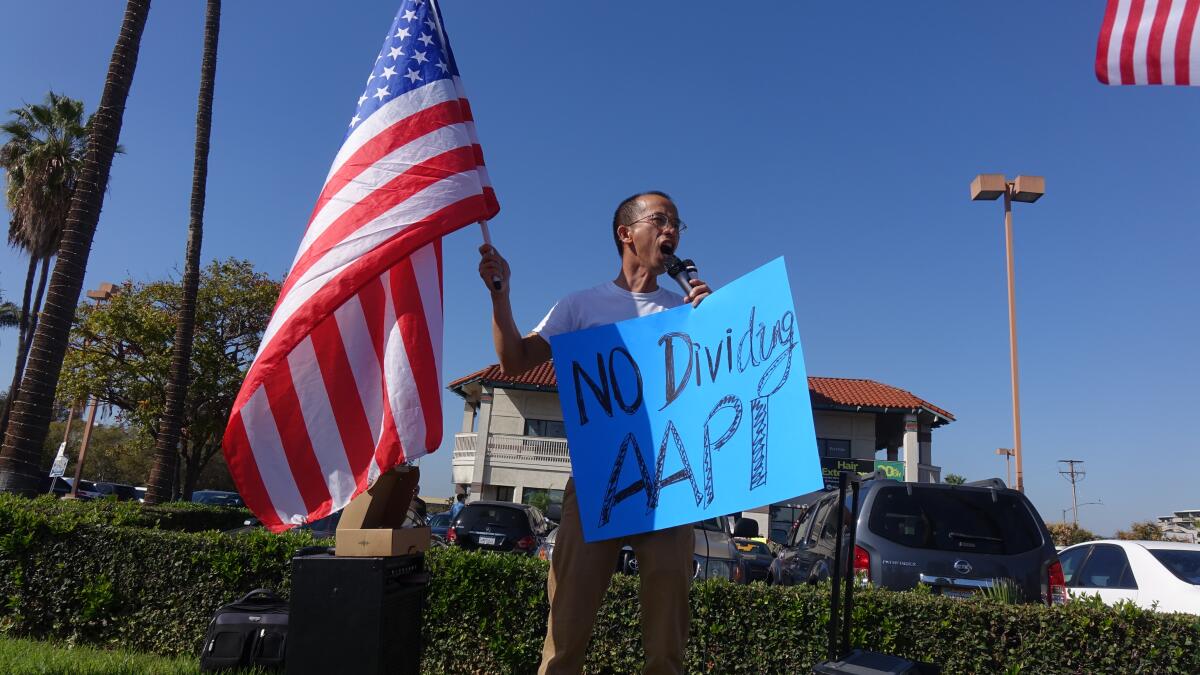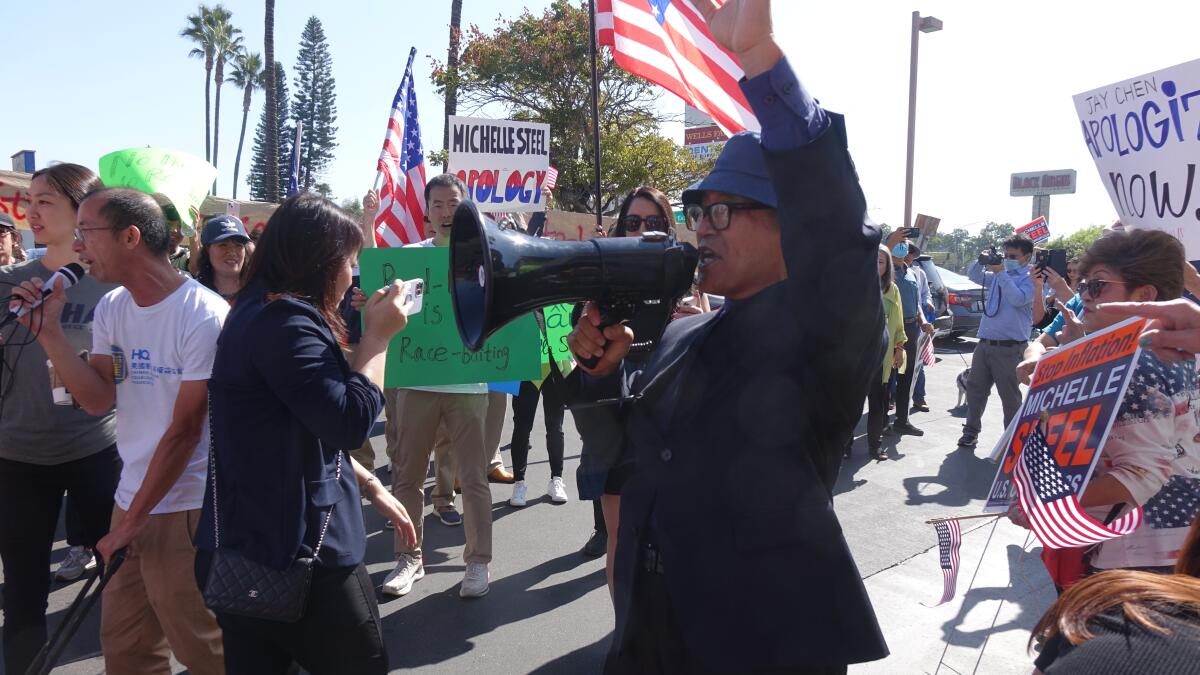California congresswoman faces accusations of ‘McCarthyism’ from AAPI groups over campaign ads

- Share via
The video opens in a dimly lit room, smoke billowing from a desktop ashtray as two actors portraying Chinese Communist Party intelligence officers discuss a California congressional candidate.
“He’s one of us, a socialist comrade who even supported Bernie Sanders for supreme leader,” one man says, a photo of Chinese President Xi Jinping on the wall behind him.
The words “Jay Chen. He’s perfect for Communist China” flash in white letters across the screen as the men throw their heads back and erupt in maniacal laughter.
The 30-second ad is the latest in a series of attacks, using doctored images and video and inflammatory language, that Republican Rep. Michelle Steel has focused on Democrat Jay Chen, who is challenging her in a competitive Orange County district. Chen, an intelligence officer in the Naval Reserve, is Taiwanese American; Steel is Korean American.
“There is an ethical issue to using these kinds of tactics and negative advertising that crosses into malicious campaigning,” said Long T. Bui, an associate professor of global and international studies at UC Irvine. “The racially charged messages reinforce stereotypes of all Chinese people as spies and permanent foreigners.”
In a midterm election that’s largely been centered on abortion rights, inflation and crime, Steel has tried to keep voters focused on China. In the 45th District — which is centered on Little Saigon, where one-third of voters are Asian American and half of those are of Vietnamese descent — there’s a deep distrust of communism among many in the community.
Steel, who in 2020 became one of the first three Korean American women elected to Congress, has sent out mailers in Vietnamese and English against Chen including one heavily manipulated flier that purports to show him holding the “Communist Manifesto” while teaching a class full of children. At the same time, in recent advertisements, she has portrayed herself as a watchdog against China.
But fallout from Steel’s campaign materials is putting her on the defensive with some Asian American Pacific Islander groups.

On Saturday, demonstrators from various Asian American Pacific Islander organizations stood along Beach Boulevard outside Steel’s campaign office in Buena Park to protest the congresswoman’s advertisements and what they called “McCarthyist tactics” being used in the race. Protesters held signs that read “stop Asian hate” and “red-baiting is race-baiting” as they called for Steel to apologize.
Zig Jiang, 48, waved an American flag as he yelled “stop dividing our communities” into a microphone. The Republican, who lives in Hacienda Heights, was angry when he saw Steel’s latest campaign video, which he said reinforced stereotypes of Asian Americans.
“Michelle Steel is using conspiracy theories and Cold War ideologies to further her campaign,” he said. “This put our communities in danger because she labeled Asian Americans, particularly Chinese Americans, as spies.”

In a counter demonstration, Steel’s supporters stood in front of her office doors holding American flags and campaign signs, which read “lower taxes” and “stop inflation.” La Palma Councilman Nitesh Patel, who attended the demonstration in support of the congresswoman, said he’s been impressed by her engagement with the community.
“She actually represents the diversity and what America truly stands for,” he said. “I mean ... she doesn’t look at race. She doesn’t look at gender. She’s out there making sure that she’s fighting for Americans.”
The two groups, which largely remained separated, converged for about five minutes as protesters marched toward the front of Steel’s campaign office. A man standing with Steel’s supporters shouted “communists” at the protesters as they passed.
“Shame on you,” a woman yelled back.
The Committee of 100, a New York-based nonprofit led by prominent Chinese Americans, this week issued a statement criticizing Steel’s ads for portraying “harmful and inaccurate stereotypes” that could fuel anti-Asian hate and calling on her to “focus on the issues.”
“A congressional race between two candidates of Asian descent should be an opportunity to highlight the diversity and achievement of the Asian American community,” said Zhengyu Huang, president of the Committee of 100. “Instead, one candidate is using racist attacks and advertisements to question the patriotism and loyalty of an American military veteran.”
Chen, who says his grandmother fled to Taiwan from China under communist rule, called Steel’s latest video “over the top” and said it’s “ridiculous” for her to accuse him of being a communist.
“I served in the Middle East and I’ve served on the Korean peninsula to confront communist aggression,” he said. “I think what she’s doing right now is really dangerous. The fact that a sitting member of Congress would try to incite this kind of anti-Asian hate to try to further the stereotype that Asians cannot be trusted when she herself is Asian — an immigrant from Korea — it just baffles the mind.”
At the heart of Steel’s advertisement is a vote Chen made in 2010 while sitting on the Hacienda La Puente Unified School District board to bring a free Chinese language and culture class to a middle school in the district. The program, known as Confucius Classroom, was paid for by the Chinese government’s Chinese Language Council International and was popular across the nation at the time.
The program sparked debate in the district, with some questioning whether it promoted propaganda from China. The board scrapped the program later that year.
Chen said in an interview with The Times on Wednesday that all the teaching materials were reviewed by the district and “there was never any communist infiltration into our classroom.” He added that he stands with the State Department assessment 10 years after the school board vote that designated the organization overseeing the institutes as a foreign mission.
Where U.S. House candidates Republican Rep. Michelle Steel and Democrat Jay Chen stand on abortion, immigration, economy, healthcare, gun control.
Lance Trover, a spokesperson for Steel’s campaign, declined to comment on the latest attack ad, or whether the campaign is still running it. The ad, which was first seen late last week on Twitter, has largely disappeared from social media.
Trover instead reiterated the campaign’s claims that Chen supports “propaganda infiltrating our schools” and denied critics’ assertions that the attacks were racist or problematic.
In 2020, the U.S. State Department under the Trump administration called the Confucius Institute U.S. Center a propaganda arm of the Chinese government. The designation didn’t force class centers to close, but required the institute to report information on U.S. personnel and operations to the State Department, according to the agency.
“The China of that time is very different from the China of today,” Chen said of the 12 years that have passed since his school board vote. “The State Department has revised its outlook. I understand the threat of Communist China very well, and my views remain aligned with the State Department. That has never changed.”
California midterm election: What to know about the House race between Republican Rep. Michelle Steel and Democrat Jay Chen in Orange and L.A. counties.
Steel also used anti-communist messaging in her 2020 race against Democratic incumbent Rep. Harley Rouda. Her campaign mailed a flier showing Rouda with a drawing of Mao and text alleging he was soft on China.
In a district where many Vietnamese American voters, particularly those who came to the United States as refugees, harbor deep resentment toward communism depicting a challenger as a sympathizer is clearly a strategic move, said Pei-Te Lien, a political science professor at UC Santa Barbara who specializes in Asian American politics.
But the tactic may hurt Steel in the long run with younger voters who are becoming more politically active in the district, she added.
“She must not be very confident in terms of her record to go to these extremes,” Lien said. “Of course it hurts the Asian American image as a whole. We have been fighting so hard against the perpetual foreigner image and this is just re-evoking it.”
The tone of the race has been heated for months.
Early in the campaign, Steel accused her rival of mocking her accent when he said people needed “an interpreter to figure out exactly what she’s saying.” Chen responded with an op-ed titled “I didn’t mock Michelle Steel’s accent” and said he was referring to her “convoluted” GOP talking points.
Now, in addition to the mailers and videos the Steel campaign has put out to try to paint Chen as untrustworthy, red and yellow signs affixed to poles and fences across the district label Chen as “China’s choice.”
Another mailer recently sent to voters in the district says Steel is “standing up to racist attacks” alongside a photo of her smiling with two other Asian American women.
More to Read
Get the L.A. Times Politics newsletter
Deeply reported insights into legislation, politics and policy from Sacramento, Washington and beyond. In your inbox three times per week.
You may occasionally receive promotional content from the Los Angeles Times.














